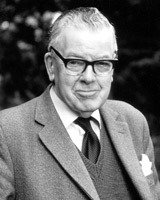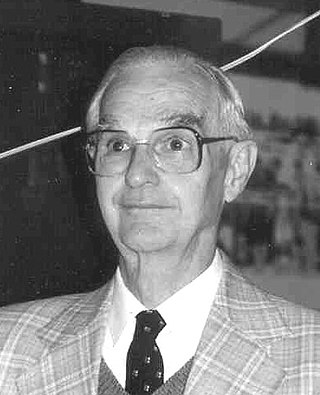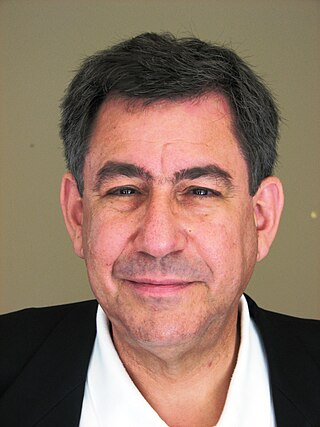Related Research Articles

Matthew the Apostle is named in the New Testament as one of the twelve apostles of Jesus. According to Christian traditions, he was also one of the four Evangelists as author of the Gospel of Matthew, and thus is also known as Matthew the Evangelist, a claim rejected by most biblical scholars, though the "traditional authorship still has its defenders."

Frederick Fyvie Bruce, usually cited as F. F. Bruce, was a Scottish biblical scholar who supported the historical reliability of the New Testament. His first book, New Testament Documents: Are They Reliable? (1943), was voted by the American evangelical periodical Christianity Today in 2006 as one of the top 50 books "which had shaped evangelicals".
Robert Dick Wilson, PhD, DD was an American linguist and Presbyterian Old Testament scholar who devoted his life to prove the reliability of the Hebrew Bible. In his quest to determine the accuracy of the original manuscripts, Wilson learned 45 languages, including Hebrew, Aramaic, and Greek, as well as all the languages into which the Scriptures had been translated up to 600 AD.

Leon Lamb Morris was an Australian New Testament scholar.
George Eldon Ladd was a Baptist minister and professor of New Testament exegesis and theology at Fuller Theological Seminary in Pasadena, California, known in Christian eschatology for his promotion of inaugurated eschatology and "futuristic post-tribulationism."
Reginald Horace Fuller (1915–2007) was an Anglo-American biblical scholar, ecumenist, and Anglican priest. His works are recognized for their consequential analysis of New Testament Christology. One aspect of his work is on the relation of Jesus to the early church and the church today. For this, his analysis, which uses the historical-critical method, has been described as neo-orthodox.
Bruce K. Waltke is an American Reformed evangelical professor of Old Testament and Hebrew. He has held professorships in the Old Testament at Dallas Theological Seminary, Regent College in Vancouver, British Columbia, Westminster Theological Seminary in Philadelphia, Pennsylvania, Reformed Theological Seminary in Orlando, Florida, and Knox Theological Seminary in Ft. Lauderdale, Florida.

Benedict Thomas Viviano a New Testament scholar and author, is a member of the Chicago Province of the Dominican Order of the Roman Catholic Church. He was on the faculty of the University of Fribourg, Switzerland, as a full professor of New Testament, teaching in the French language. Before teaching in Fribourg, he taught for 11 years at the Ecole Biblique in Jerusalem, and 12 years at Aquinas Institute of Theology in St. Louis. He was vice president of the Tantur Ecumenical Institute for Theological Studies in Jerusalem.
Peter Eric Enns is an American Biblical scholar and theologian. He has written widely on hermeneutics, Christianity and science, historicity of the Bible, and Old Testament interpretation. Outside of his academic work Enns is a contributor to HuffPost and Patheos. He has also worked with Francis Collins' The BioLogos Foundation. His book Inspiration and Incarnation challenged conservative/mainstream Evangelical methods of biblical interpretation. His book The Evolution of Adam questions the belief that Adam was a historical figure. He also wrote The Bible Tells Me So: Why Defending Scripture Has Made Us Unable to Read It and The Sin of Certainty: Why God Desires Our Trust More than Our 'Correct' Beliefs.
Graham Norman Stanton (1940–2009) was a New Zealand biblical scholar who taught at King's College, London, and as Lady Margaret's Professor of Divinity at the University of Cambridge. A New Testament specialist, Stanton's special interests were in the Gospels, with a particular focus on Matthew's Gospel; Paul's letters, with a particular focus on Galatians; and second-century Christian writings, with a particular interest in Justin Martyr.

Grant R. Osborne was an American theologian and New Testament scholar. He was Professor of New Testament at Trinity Evangelical Divinity School.
George William Knight III was an ordained minister in the Orthodox Presbyterian Church. He was a theologian, author, preacher, churchman, and adjunct professor of New Testament at Greenville Presbyterian Theological Seminary in Taylors, South Carolina. Formerly, he was the founding Dean and Professor of New Testament at Knox Theological Seminary. Prior to his appointment at Knox Theological Seminary, he taught New Testament and New Testament Greek at Covenant Theological Seminary in St. Louis, Missouri. As a pastor, he planted Covenant Presbyterian Church in Naples, Florida and has served numerous other local churches in the Presbyterian Church in America and the Orthodox Presbyterian Church. A former president of the Evangelical Theological Society, he has also taught and preached the Bible at many other seminaries and churches around the world. He has authored several works, most notably The Pastoral Epistles and a short commentary of Timothy and Titus as included in the Baker Commentary on the Bible. He received his theological doctorate from Free University of Amsterdam in 1968. Dr. Knight was a member of the General Assembly-appointed Ad Interim Committee to study the number of ordained offices in the Presbyterian Church in America according to Scripture. His Ad Interim Report of the Number of Offices by George W. Knight IIIArchived 2011-09-27 at the Wayback Machine was incorporated into the polity of the Presbyterian Church in America. He also served on an ad interim committee to study the issue of marriage, divorce and remarriage, which brought about the 1992 publication of a Position Paper of the Presbyterian Church in America on Remarriage and Divorce, 1992.Archived 2011-09-27 at the Wayback Machine.
Loren T. Stuckenbruck is an historian of early Christianity and Second Temple Judaism, currently professor of New Testament at the University of Munich, in Germany. His work has exerted a significant impact on the field.
Joel B. Green is an American New Testament scholar, theologian, author, Associate Dean of the Center for Advanced Theological Study, and Professor of New Testament Interpretation at Fuller Theological Seminary in Pasadena, California. Green is a prolific author who has written on a diverse range of topics related to both New Testament scholarship and theology. He is an ordained elder of the United Methodist Church.
Craig S. Keener is a North American academic, Charismatic Baptist pastor, theologian, Biblical scholar and professor of New Testament at Asbury Theological Seminary.
David E. Garland served as the interim president of Baylor University in Waco, Texas. His term began in June 2016 amid the Baylor sexual assault scandal and resignation of former president Ken Starr. Garland's term concluded on May 31, 2017.

William L. Lane was an American New Testament theologian and professor of biblical studies.
Paul R. House is an American Old Testament scholar, author, and seminary professor who served as 2012 president of the Evangelical Theological Society. He is professor of divinity at Beeson Divinity School, an interdenominational seminary in Birmingham, Alabama.
Thomas R. Schreiner is an American Reformed New Testament scholar. He is the James Buchanan Harrison Professor of New Testament Interpretation at the Southern Baptist Theological Seminary. He previously taught at Bethel University and Azusa Pacific University. He is also co-chairman of the Christian Standard Bible's Translation Oversight Committee and is the New Testament editor of the ESV Study Bible. Schreiner has degrees from Western Oregon University, Western Seminary, and Fuller Theological Seminary.

J. Ramsey Michaels, Th.D., Harvard was an American theologian who was for many years a professor at Gordon-Conwell Theological Seminary and Southwest Missouri State University. He continued to teach occasionally as an adjunct professor at Bangor Theological Seminary in Portland, Maine, and as a visiting professor at Fuller Theological Seminary in Pasadena. He is perhaps best known for his commentary on John which is a replacement volume in the New International Commentary on the New Testament series.
References
- ↑ "Donald Hagner". fuller.edu. Archived from the original on April 2, 2015. Retrieved July 26, 2017.
- ↑ "Hagner, Donald Alfred". worldcat.org. Retrieved April 11, 2017.
- ↑ "Donald Hagner" . Retrieved April 11, 2017.